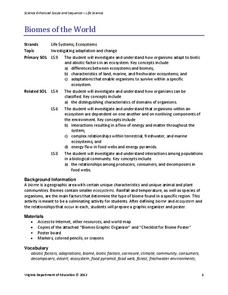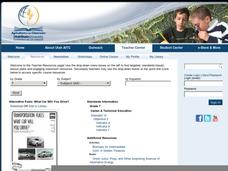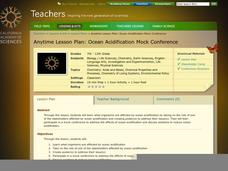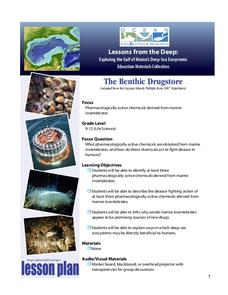Curated OER
Treasures in Jeopardy
In small groups, middle schoolers research deep-sea coral reefs and design a poster to educate the public about their importance. They compare them to shallow-water reefs and consider the impact of bottom-trawl fishing. Many internet...
NOAA
Sustaining Our Ocean Resources
Lead young scientists on an investigation of fishery practices with the final installment of this four-part unit. Using a PowerPoint presentation and hands-on simulation, this activity engages children in learning how fish populations...
NOAA
Build Your Own Ocean Ecosystem
Hold the sea in the palm of your hand! Amateur oceanographers work together to create models of an ocean ecosystem in the sixth and final installment in a series. Raise awareness of global ocean health issues through guided research,...
Curated OER
Using Environmental Models to Determine the Effect of Acid Rain on an Ecosystem
Demonstrate to your middle school science learners how chalk breaks down in a weak acid. Discuss what affects acidic rain might have on ecosystems. Lab groups then choose one of two questions: "How does acid precipitation affect an...
NOAA
To Explore Strange New Worlds
It's time to boldly go where your class has not gone before! The introductory lesson plan in a five-part series takes young oceanographers aboard the NOAA Ship Okeanos to begin a study of ocean exploration. The lesson plan includes a...
NOAA
Journey to the Unknown
Go where no one has gone before. Learners experience what it is like to be a scientist exploring new territory. Using audio and a scripted text, pupils take a trip in the depths of the ocean. They follow their trip with a hands-on...
National Wildlife Federation
Plastic in the Sea
How much plastic do people use? Class members identify how plastic is involved in their daily lives by looking at food packaging either at a grocery store or at home. Learners view statistics for the amount of plastics found on a beach...
Aquarium of the Pacific
Kelp Forest Conservation
There otter be a better way. As a class, groups work together to create a food web based on the organisms in the kelp forest. Budding scientists watch a video on the kelp forest to see how the organisms create a food web and hear about...
Polar Trec
Nature's Density Column
Nature provides density columns in the polar regions that provides food for many animals. Young scientists build their own density columns with water in order to answer analysis questions. Through a slideshow presentation, scholars...
NOAA
Journey to the Unknown
What's it like to be a deep-sea explorer? Tap into the imaginations of your fifth and sixth graders with a vivid lesson, the second part of a six-part adventure. Learners close their eyes and submerge themselves in an expedition aboard...
Virginia Department of Education
Biomes of the World
Incorporate knowledge about biomes and ecosystems in multiple ways while encouraging creativity. Emerging ecologists collaborate and perform research to complete a graphic organizer about various biomes of the world. They conclude the...
Virginia Department of Education
The Cycles of Nature
Encourage peer collaboration and assist with the creation of visual aids to identify carbon, water, and nitrogen cycles as your class learns more about nature. They discuss relative information, create a visual aid depicting the chosen...
University of Georgia
Land Biomes Project
Challenge scholars to research a biome and create a presentation for the producers of Survivor to choose their ecosystem for the next season's show. The materials include outlines, worksheets, and grading rubrics for individuals as well...
Virginia Department of Education
Go with the Flow
How does nature's hierarchy relate to our local human environment? Answer this question, along with others, as the class visually depicts the natural hierarchy provided by nature. Pupils discuss each piece of the pyramid and its energy...
Ocean Explorer
Looking for Clues
Upper graders become "shipwreck detectives" by studying the debris field from a shipwreck in the Aegean Sea which took place in the 700s. A website is accessed that gives specific information about the debris field, and pairs of...
Curated OER
Transportation Fuels: What Car Will You Drive?
How many different types of biofuels are out there? Seventh graders watch a series of videos and participate in a series of activities in order to better understand all the transportation options available. They consider what type of car...
California Academy of Science
Ocean Acidification Mock Conference
In a comprehensive role playing activity, teens play the parts of different stakeholders in the realm of acidic oceans. They research, debate, and create a presentation from the perspective of either ocean organisms, the fishing...
Curated OER
Sustainability and Extinction
Galapagos Penguins are the only penguins on earth that live north of the equator (in the wild). In this last lesson plan a discussion on how the Galapagos islands developed their populations and diversity sparks the introduction. Two...
NOAA
Importance of Deep-Sea Ecosystems – The Benthic Drugstore
You never know what you will find next in the deep sea ecosystem. So far, scientists have found items that work as anti-tumor agents, anti-inflammatory agents, agents that stop uncontrolled cell division, and much more. The lesson begins...
Curated OER
Faking It
Middle school earth scientists describe the behavior of the Coriolis force. They compare and contrast conditions under which the Coriolis force has a significant impact with conditions under which it has very little. They model the...
Florida International University
Design Your Own
Apply scientific principles to designing an experiment to study organisms living on the coral reef in our oceans. Through reading, individuals learn about the coral reef ecosystem and important factors that affect its function. Using the...
NOAA
Wet Maps
How do oceanographers make maps under water? Junior explorers discover the technologies and processes involved in creating bathymetric maps in part three of a five-part series designed for fifth- and sixth-grade pupils. The lesson...
It's About Time
Mass Extinction and Fossil Records
The focus of a fossil-based lesson uses graphs and charts that allow young paleontologists to make inferences about events of mass extinction. They must apply their previous knowledge about fossil records in this final lesson of the...
Wilderness Classroom
Pollution
Educate scholars on pollution—air, water, and land—with a series of lessons that begin with a thorough explanation of each type. Learners then take part in three activities to reinforce the importance of reducing pollution. They...

























